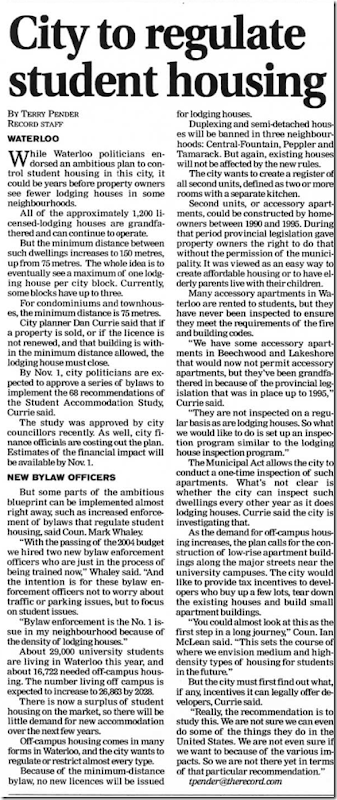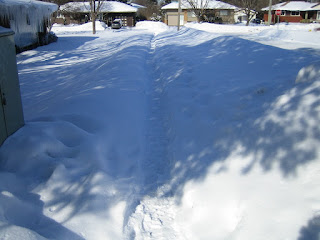 From the Cord
From the CordCity councillors to lead planning for 'student ghetto'
Nick Lachance
December 2, 2009 5:36 AM
Linda Givetash
On Nov. 26, a town meeting was hosted in St. Michael’s Church for the Northdale community to discuss the future of the area as the neighbouring universities continue to grow.
“We’re not a permanent resident and student neighborhood anymore, we’re a student neighborhood with a few remaining permanent residents,” said Christine Carmody, area resident and member of Help Urbanize the Ghetto in Waterloo (HUG Waterloo).
The population of Northdale – the area north of Wilfrid Laurier University between the University of Waterloo and King Street – has transformed from primarily long-term residing families to frequently moving students.
Before attendees broke into discussion groups to critique the community vision presented by councilor Jan d’Ailly and city staff, members of HUG Waterloo stepped in to present their alternate proposal.
“We don’t feel that our voice is being heard by our own councilor,” said Jim Flynn, member of HUG Waterloo.
“We’ve had meeting after meeting and we always seem like we’re starting but really ... it’s a failure to launch,” he added.
This town hall acted as a follow-up to the meeting held in April 2009 which addressed the major concerns of both permanent and student residents.
The vision proposed by the city encompassed those concerns and outlined the developments they would like to see in the future.
Having looked over both proposed visions, councilor d’Ailly said, “Actually if you take a close look at it they’re remarkably similar. There’s about 80 per cent overlap.”
This was not a view shared by HUG Waterloo members. “The one with the city, the one that Jan d’Ailly created, I don’t think represents all of the city, it’s completely unrealistic,” said Carmody.
The solution proposed by HUG Waterloo is to rezone the area to allow for higher density housing, such as apartment buildings, that are designed for the student lifestyle.
“Our houses just don’t suit the purpose [of residents] that actually live in our community, so why not build something that’s actually good for students,” said Carmody.
Regardless of the problems with the current measures in place for housing in the area, students should still be informed and engaged in order to help progress community development.
“I think the first step is not to be putting yourself in a bad situation,” said third-year Laurier student Jackie Dobson, who is chair of the Mayor’s Student Advisory Council (MSAC).
“Students [need to] become aware of these issues before they’re in these situations, because once you’re in these situations you’re bounded by a 12-month contract that you cant get out of,” added Dobson.
In addition to the physical faults of the area, the relationship between students and permanent residents, including behavioural concerns, were discussed.
“I regret that we’re constantly labeling the whole student group as a problem when they’re not,” said Mayor Brenda Halloran on the frustrated accusations made by some community members.
“There will be a few students that might act up but there are a thousand, tens of thousands that don’t,” said Halloran.
The next step for the community had originally included the creation of a small committee to develop a more concrete plan for the area. This was scrapped in favour of allowing city council to draw the options.
Laurier student Asif Bacchus was first to raise the idea of allowing city officials to develop a plan rather than place the burden on community members.
“What’s happened at the last few meetings and especially this meeting its been made really, really clear what the people in that area want,” said Bacchus.
“It’s time for city council to … put all those opinions together into a cohesive plan for the future to make what everyone wants a reality.”
According to d’Ailly, proposals should be completed in January of next year with a final vision ready for council in March.
Check out HUG's blog www.hugwaterloo.com

















































